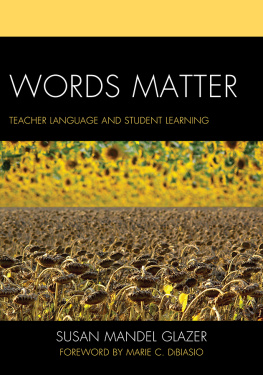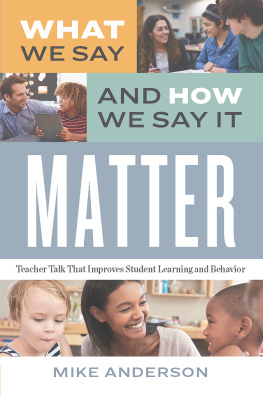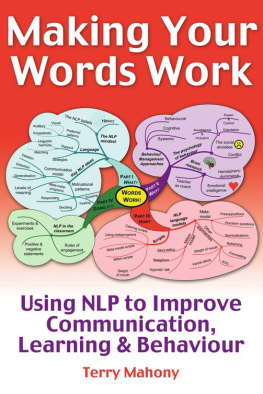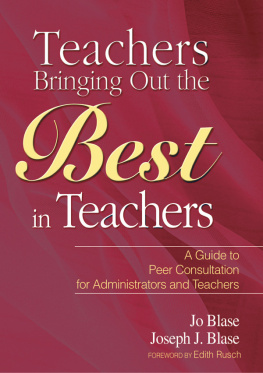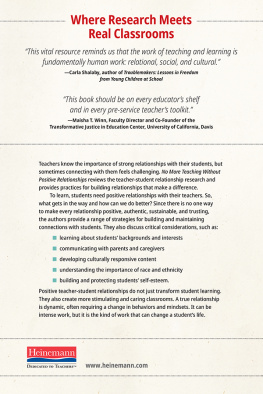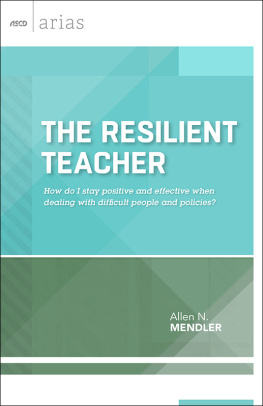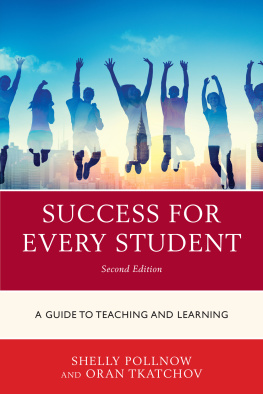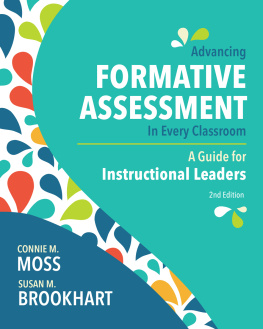About the Author
Susan Mandel Glazer is professor and director of the Graduate Program in Reading/Literacy Education and the founder and director of the Center for Reading and Writing at Rider University in Lawrenceville, New Jersey.
She received her EdD in Literacy Education from the University of Pennsylvania.
During the course of her illustrious career, Dr. Glazer has authored and coauthored eighteen books and more than two hundred articles and columns, as well as numerous chapters in edited volumes. Some of her books include Portfolios and Beyond: Collaborative Assessment in Reading and Writing ; Teaching All Children to Write: A Little Comprehensive Guide ; Phonics, Spelling, and Word Study ; Assessment IS Instruction: Reading, Writing, Spelling and Phonics for ALL Learners ; and Beyond the Looking Glass: Self Reflection and Evaluation = More Effective Teaching , all published by Christopher-Gordon.
She served as president of the International Reading Association from 1994 to 1995.
AFTER-WORDS
WordS matter!
Sometimes said without thought,
Sometimes learned but not taught,
WordS matter!
WordS matter!
They incite war and peace,
And direct the cops beat,
They spur smiles and cries,
And can swoop through the skies,
WordS matter!
SMG
Acknowledgments
The following professionals have contributed their expertise to the texts content. Their input has made the experience delightfully collegial and academically sound. Their work is to be commended, their collegiality revered.
Stefan Dombroski, psychologist
Morton Botel, professor
Phyllis Fantauzzo, school psychologist
Erik Heinicke, reading clinician
Candy Mulligan, language arts and social studies, K4
Joanna Claps-Allen, high school English teacher
Gail Turner, administrative specialist
Reflections on learning have been contributed by the following:
Emmanuel Ahia, counselor educator, New Jersey
Donatella Arpaia, attorney and restaurateur, New York, Florida
David Burke, celebrity chief and restaurateur, Chicago, Connecticut, New Jersey, New York, Las Vegas
Sue Canavan, publisher, Massachusetts
Genevieve Deal, reading specialist, Pennsylvania
Marie C. DiBiasio, university dean (retired), Rhode Island
Robert Florsheim, attorney, New Jersey
Ernst Heilbrunn, physician (retired), New Jersey
Katherine T. Hoff, university professor (retired), New Jersey
Lee Bennett Hopkins, author and poet, Florida
Sapargul Mirseitova, Fulbright scholar, Kazakhstan
Jeanne Paratore, professor, Massachusetts
Mordechai Rozanski, university president, New Jersey
Natalia N. Smetannikova, university professor, Russia
Jane Sullivan, university professor (retired), New Jersey
Boris Vilic, university dean, New Jersey
Peter Yi, physician, New Jersey
Donna Zarzecki, middle school teacher, New Jersey

merci
danke
gracias
Thank you
To the two best friends in my life, Ernie Heilbrunn and Rick Glazer
for proof reading this manuscript!
Appendix A:
Workshop: Now Its Your Turn
A wise man reflects before he speaks, a fool speaks and then reflects on what he has uttered.
DeLille, a French poet (17381813)
Like Candy, the teacher in chapter 3, you need to peek into the looking glass and reflect and then establish the disciplinary role you play and the teaching model that best represents your actions with your children. Once that is established, you will have a framework that should guide you to look into the mirror again and ask, Do I perceive myself as my students, their caregivers, my colleagues, and others in my life do?
REVIEW THE TEACHING ROLES AND MODELS
Start by reviewing the three categories of roles that teachers play: (a) negative, (b) authoritarian, and (c) supportive. Children learn from the pitch and tone of your voice, as well as from your expressions and your language, how they are supposed to respond. If you are supportive, they can tell, and they will take risks. If you are negative or authoritarian, passive learning becomes the mode. Children learn that it is better to say nothing than to be demeaned or embarrassed, especially in front of others. Derogatory, demeaning, critical, unfavorable, uncomplimentary, insulting, offensive, personally abusive, rude, nasty, mean, or hurtful language reduces students desire to learn. It inhibits thinking and destroys creative thought. The tables in chapter 3 list some remarks that negative thinkers often say to children. The variety of examples should be sufficient for you to judge the tone of your comments to the children you mentor.
THE ROLES
A quick review of the disciplinary role you play is the way to begin. Just a bit of guidance to get started: Negative power players are usually I-me teachers. They seem omnipotent and usually think of themselves as the authority, the almighty, the one who has all the answers. These teachers hold others, even children, responsible for their own behavior and idiosyncrasies. I cant do my work unless you stop swinging your leg under your desk is an example of this. The leg swinger accepts the blame, and the onus of the teachers inability to work falls on the child. Children in this situation seldom protest the outrageous accusations.
These teachers are much like a Sherlock Holmestype character. They spy, looking for offenses, usually inconveniences, that impinge on their comforts: Keep your paper straight so that I dont have a hard time reading your handwriting or Are you sure you will remember to do those six math problems? Ill send a note home to your mom so that she can remind you.
This teacher directs, provides rules autocratically, and threatens. If you dont write it exactly as I said, I will ask you to throw the paper away and begin again. The disciplinarian is self-centered and often insensitive to a students needs. When a teacher responds to a request to go to the bathroom by saying, You can go to the bathroom after you finish your math problems, this is truly insensitive. Denying anyone, especially a child, the need for physical relief is intimidating, stifling, demeaning, suffocating, and physically harmful. What if the child is asking to leave just to get out of the classroom? some people ask. If the youngsters use that as an excuse, there must be a good reason for it. Escaping from a restricted, regimented environment that forbids children to be children becomes a goal.
Authoritarian teachers seem kind but are often condescending: Dont worry, dear. Im here to help you if you cant do that math problem indicates that the teacher is a rescuer. Before you begin to write your poem, let me see your outline lets the students know that they are unable to do it on their own. This is the person who helps eleven-year-olds with their coats and who sends home written notes so the students wont forget something. This teacher is the forever parent creating dependent rather than independent children. She is like the stage-door mama, who needs control and who pulls on the reins from behind the stage to keep the child from stealing the spotlight.
The supporter searches for ways to guide students to become independent. When a seventh-grader asked, again and again, Im finished reading the assignment. Now what do I do? the supporting teacher knew that she had to find ways to guide this college-bound student to make decisions on his own. She developed a contract for the young teen. The next time he asked for an assignment, the teachers response was, Look at your contract. It will direct you to the next assignment. This is truly a supportive teacher. She finds appropriate strategies and uses them when the need arises.
Next page
